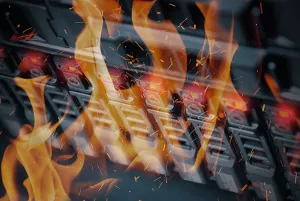We’re living in uncertain times, and for businesses that means new challenges. But some challenges aren’t so new. Hackers are still going after your data—and your money—only with greater frequency. Ransomware attacks increased by an incredible 40 percent year over year in Q3 of 2020. That totals 199.7 million cases worldwide. In a quarter. Add in other forms of cyberattacks, malicious internal users, and natural disasters, and the case is clearly made that every business should have a well thought out disaster recovery (DR) plan in place. We’ve recently posted a DR planning checklist you can use as a starting point. But, given the statistics, you should seriously consider including disaster recovery as a service (DRaaS) as part of your plan, no matter what size or kind of business you’re in. Here’s why.
Built for Business Continuity

StorageCraft Cloud Services is a DRaaS solution that offers you everything from file and folder recovery and machine virtualization to instant failover of an entire site and network. DRaaS failover means automatically switching to your replicated data in the cloud if disaster should strike. So you’ll be back in business in no time, keeping costly downtime to a minimum.
Flexible and Available
DRaaS solutions are usually delivered based on a service-level agreement (SLA). That lets you choose the structure you need to meet your disaster recovery (DR) plan thresholds and requirements, including your recovery time objective (RTO) and recovery point objective (RPO).
You’ll want a DRaaS solution that lets you customize your cloud storage to fit your needs, whether your IT environment is small and simple or big and complex. You should be able to easily control your cloud settings and count on predictable monthly pricing.
Cost-Effective and Scalable
Because a DRaaS solution replicates your data to the cloud, it eliminates the need to set up a complete secondary data center to use for DR. While you should still replicate your data offsite and preferably off-network (as we recommend in our take on the traditional 3-2-1 backup rule), with DRaaS in place you can cut the amount you spend on redundant hardware. For companies that have in-house IT teams, DRaaS can free up those individuals to focus on innovation and business needs. And DRaaS can be especially valuable for small and medium-sized businesses that lack the internal expertise needed to develop and execute a DR Plan.
You’ll want to be sure your DRaaS provider offers guaranteed uptime. With StorageCraft Cloud Services you get a DRaaS solution that saves your data to a cloud that was purpose-built for business continuity, delivering 99.999+ percent uptime. Maximizing uptime to that level requires a highly distributed and fault-tolerant disaster recovery cloud. So you can be certain that your data will be there when you need it. And with a cloud solution, you can scale quickly and easily as your needs grow.
Secure, Anywhere Access and Instant Recovery
Look for a DRaaS solution that lets you remotely manage your cloud backup and recovery. StorageCraft DRaaS features an easy-to-use, self-service online portal that includes privacy and security measures that ensure that you are the only one who can access stored backup images. The portal also gives you complete control over networking, for seamless failover during a disaster.
You may also want to add advanced network-recovery options that let you run your network in the cloud—exactly as you’d run it onsite—so downtime becomes a thing of the past. Other advanced DRaaS features worth considering include one-click failover that lets you configure the sequence, order, and timing for each mission-critical system, and gives you the ability to start a site-wide failover process (or test) with the push of a button.
Weighing the Costs and Benefits
Ultimately, deciding whether DRaaS is right for your business comes down to numbers. Can it fit within your budget? And can you afford to live without it? On that note, we can only point out that a single hour of downtime can cost a small or medium business (SMB) $100,000 or more an hour. Whether the cause is a hardware failure, ransomware attack, or natural disaster, you need to be prepared. DRaaS is one way you can know with certainty that your business can and will recover quickly. Learn more about DRaaS by scheduling a demo with a StorageCraft engineer.
You May Also Like
- Backup and Disaster Recovery Data Resilience
Introducing Arcserve 10000 Series Appliances: Rapid Deployment. Enhanced Security. Simplified Compliance.
December 10th, 2024 - Backup and Disaster Recovery Business Continuity Cloud Compliance Cybersecurity Data Protection Data Resilience Data Storage Ransomware
The Importance of Versatile Cloud Data Protection Support in a Multicloud World
December 3rd, 2024 - Backup and Disaster Recovery Business Continuity Cybersecurity
Tech Conversations - Beyond the Arc: Cyber Confidence for Business Leaders
December 2nd, 2024